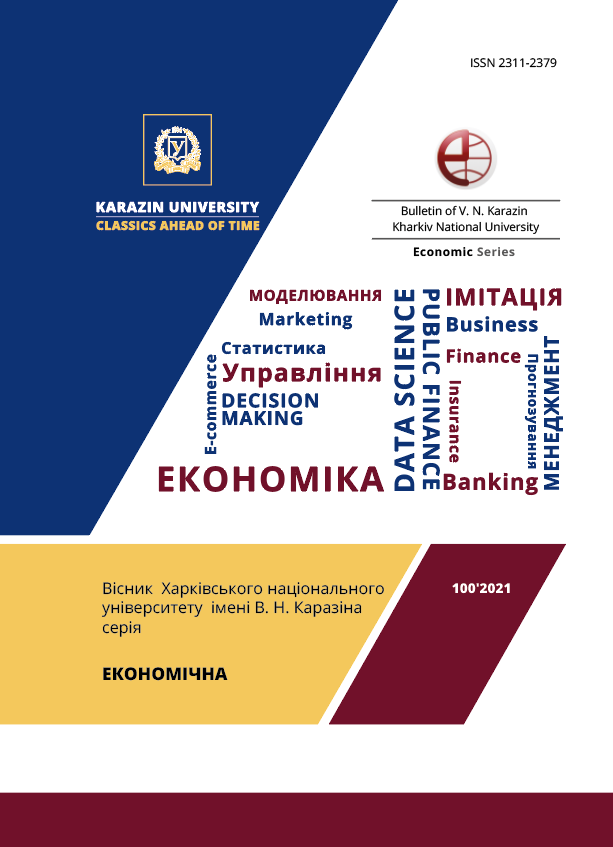TRUST MODELING: A PROBABILITY APPROACH
Abstract
The work is devoted to describing an application of the DeGroot model in the following analysis: is it possible to establish a consensus of opinions of members in a social group (a society). This model describes the process of changing the agents’ opinion about a certain event or statement, factoring in the effect of interpersonal trust between agents, which is modelled by Markov chains. Agents’ opinions are represented by the probability of them showing their support to a given statement (event). The interpretation of the DeGroot model is quite broad. It includes, in particular, the study of economic decision-making, the influence of public opinion on people and the fact of achieving a consensus. The paper considers the conditions under which the process of updating the opinions of agents, belonging to a social group (network), converges to a certain limit value - a consensus, i.e. a case when all agents in a social group have the same opinion on a particular issue. We also show some generalizations of the DeGroot model, namely those that concern adding time dependency to the rules of updating the opinions of agents. To test the DeGroot model, we implemented the two-dimensional case as a dynamic Microsoft Excel workbook. The paper describes 2 types of problems related to reaching a consensus, solved with the model. The first kind of problem constitutes an analysis of possibilities of obtaining the desired consensus with a given matrix of trust (interpersonal trust of agents), whilst changing the initial group members’ opinions vector about an event (statement). We also discuss a solution of the inverse problem: find the trust matrix such that the iterative opinion update process converges to the desired consensus with a given initial vector of opinions. The results we obtained may be used for analyzing the process of managing public (collective) opinion concerning certain economic decisions in a social group (network).
Downloads
References
Gubanov, D.A., Novikov, D.A. & Chkhartishvili, A.G. (2009). Social media influence models. Management in socio-economic systems, 27, 205-281. (in Russian)
Fukuiama, F. (2004). Trust: social virtues and the path to prosperity:monograph. Moscow: ACT Publishing House: CJSC NPP Ermak. (in Russian)
Creed, W. E. & Miles, E. (1996). Trust in organizations: A conceptual framework linking organizational forms, managerial philosophies, and the opportunity costs of controls. Trust in organizations: Frontiers of theory and research, 16-38. doi: https://doi.org/10.4135/9781452243610.n2.
DeGroot, H. (1974). Reaching a consensus. Journal of the American Statistical Association, 118-121.
DeMarzo, P., Vayanos, D. & Zwiebel, J. (2003). Persuasion Bias, Social Influence, and Unidimensional Opinions. Quarterly Journal of Economics, 909-968. doi: https://doi.org/10.1162/00335530360698469.
Dumouchel, P. (2005, May 16). Trust as an action. Euro. J. Sociol, 417-428. doi: https://doi.org/10.1017/S0003975605000160.
Hegselmann, R. & Krause, U. (2002). Opinion Dynamics and Bounded Confidence Models, Analysis, and Simulations. Journal of Artifical Societies and Social Simulation, 1-33.
Jackson, О. (2008). Social and Economic Networks. Forthcoming: Princeton University Press.
Kipnis, D. (1996). Trust in Organizations: Frontiers of Theory and Research. London: SAGE Publications.
Kramer, R. & Tyler, T. (1996). Trust and Technology. London: SAGE Publications. doi: http://dx.doi.org/10.4135/9781452243610.
Rotter, J. B. (1967). A new scale for the measurement of interpersonal trust. Journal of Personality, 651–665. doi: https://doi.org/10.1111/j.1467-6494.1967.tb01454.x.
Sztompka, P. (1999). Trust: A Sociological Theory. Cambridge: University Press.
Yamamoto, Y. (1990). A Morality Based on Trust: Some Reflections on Japanese Morality. Philosophy East and West, 451-469. doi: https://doi.org/10.2307/1399351.

